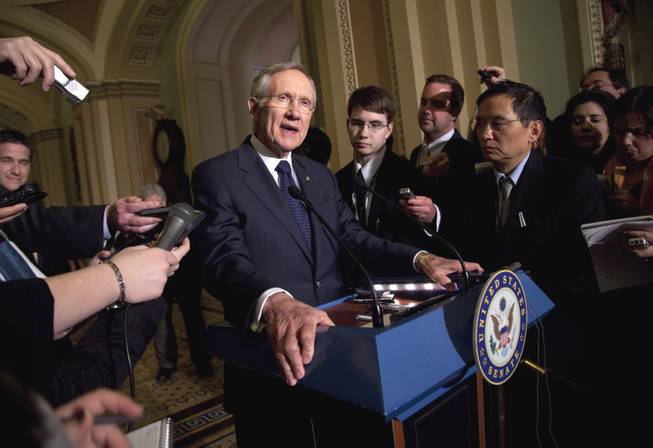
AP Photo/Evan Vucci
Senate Majority Leader Sen. Harry Reid talks to the media after a Democratic policy luncheon on Tuesday, March 1, 2011, in Washington.
Published Tuesday, March 1, 2011 | 1:41 p.m.
Updated Tuesday, March 1, 2011 | 10:19 p.m.
Sun Coverage
Sun Archives
Shutdown fears, begone. For now.
The House of Representatives neatly passed a two-week spending measure Tuesday night after about a day of debate -- and the Senate is expecting to do the same Wednesday morning. That means Social Security checks will still be processed, veterans will receive their benefits, federal employees won't be furloughed, and if you happen to have been planning a spring break vacation to Washington, D.C., the Smithsonian will be open.
But while it's a welcome end to a tense standoff, the budget bill only tides things over until March 18, by which point lawmakers have to iron out serious philosophical differences over how best to pare down the federal government's annual kitty for 2011.
House Republicans are still gunning for a measure that would reduce the fiscal 2011 budget to $61 billion less than fiscal 2010 levels -- those being what the country is currently being funded at, through a series of continuing resolutions that have kept programs afloat in the absence of an official federal budget since early October.
House Democrats want no part of it. They propose keeping the budget at fiscal 2010 levels -- which, they say, is a $41 billion “cut” below what the president had wanted to spend in fiscal 2011 already -- in order to make sure they don’t clip the wings of economic recovery in Congress’ haste to dramatically reduce spending.
While lawmakers were able to resolve the immediate crisis fairly painlessly, the greater standoff has made both sides a little trigger-happy politically. The most recent example was last week, when Reid’s office sprang to trash Speaker John Boehner’s two-week proposal as an uncompromising mini-version of the GOP’s preferred cuts package -- only to seemingly recant later in the week, once it became clear that the Republicans’ cuts were loosely built around a Democratic agenda backed by President Obama.
But it’s not likely that in the longer-term Republicans are going to chuck their budget objectives for an Obama-inspired budget.
The House has already passed a bill to reduce the federal budget according to GOP objectives, which include cuts to education, renewable energy, job training and foreign aid programs, although not directly to Social Security. Both parties appear to be waiting for the president to take the lead on that particular piece of entitlement reform.
Democrats oppose both the character and the extent of the Republicans’ changes, setting up a hard road ahead in the next few weeks.
Even the White House today seemed to signal it didn’t think House and Senate leaders would be able to resolve their differences in time.
“If $4 billion in cuts over two weeks is acceptable ... $8 billion over four or five weeks is something that we could agree on,” said White House spokesman Jay Carney on Tuesday in his regular briefing with White House reporters -- a measure that would, most obviously, buy lawmakers more time.
But Republicans balked at the idea of a 30-day stopgap measure earlier when Reid proposed it -- although it should be noted that Reid’s month-long proposal didn’t contain those $8 billion in cuts.
Reid wasn’t particularly forthcoming about the president’s proposal, but was outspoken in his suspicion of Republican leaders’ trustworthiness as a negotiating partner.
“Each one of the votes that I’ve seen are terribly mischievous,” Reid said Tuesday. “And wrong-headed, and wrong-sided.”
Reid and Boehner met Monday night to discuss budget proposals, but there’s no indication that the two have reached any agreement except that cuts ought to be made from current funding levels. That indicates compromise lies somewhere between fiscal 2010 spending levels and $61 billion less than that -- but where the final equilibrium lies is unclear.
For now, however, Republicans in the House are welcoming Reid's willingness to go along with their resolution -- something House Minority Leader Nancy Pelosi didn't support.
"Ignoring our nation's looming debt is no longer an option for Congress," Nevada Rep. Dean Heller said Tuesday. "Once again, the House has made tough decisions to cut spending to so we can begin to place our country on a more fiscally sustainable path ... It is my hope the Senate approves this measure quickly so we can address long-term government spending."
Rep. Joe Heck, R-Nev., said, “As I’ve said all along, my goal is to control spending, not shut down the government. Every day more evidence points to the fact that the federal government is full of waste, fraud and abuse. Congress’ duty is to protect taxpayers by identifying and ending government’s wasteful spending habits."
House Democrats also praised the agreement but struck a different tone on the coming two weeks.
“My hope is that we’ll see real negotiations replace the ‘take-it-or-leave-it’ attitude that has been on display and that we’ll be able to reach a true compromise that allows us to avoid a government shutdown,” said Nevada Democratic Rep. Shelley Berkley.


Join the Discussion:
Check this out for a full explanation of our conversion to the LiveFyre commenting system and instructions on how to sign up for an account.
Full comments policy